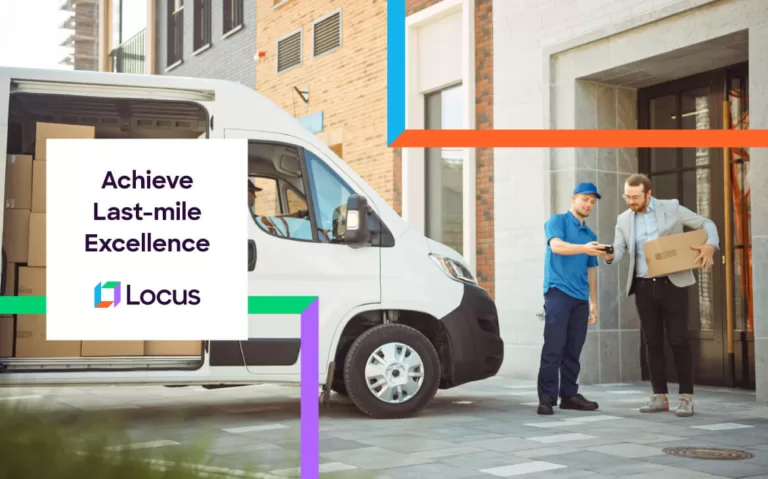Blog, E-Commerce, General, Last Mile Delivery Optimization
How Japanese E-commerce Brands Can Overcome the Challenges in Last-Mile Deliveries
Apr 7, 2022
5 mins read

It’s one thing delivering parcels on time in any country; it’s quite another delivering parcels on time in Japan. That’s because Japan’s standards for home delivery services are very high. Everything from delivery to returns, to exchanges, to customer care, even curbside or Buy Online Pick-up in Store (BOPIS) methods must be impeccable to keep the Japanese customers satisfied. The nation has high expectations from customer service and hospitality and consumers notice even slight delays in delivery.
As delivery times become shorter, logistics providers are faced with increased volumes of goods, high delivery costs for customers, less flexibility with delivery time slots and more traffic on the roads. In this blog we will see how Japan’s market challenges are unlike any other, and why brands require solutions that are specially suited to them.
Online shopping leads the way
According to a report, in 2020, nearly half the households with two or more people purchased goods or services online—the highest in the last ten years in Japan, with most consumer expenditure on travel, mobility and accommodation. Leisure-related goods were a recurring category of online purchasing. The revenue in the e-commerce market is projected to reach US $215,113 million in 2022.

The pressure on brands to carry out seamless on-time deliveries has also gone up since the market significantly expanded in 2020. Covid-19 drove the demand for deliveries and in 2020 alone, the last-mile delivery logistics market size amounted to 2.54 trillion Japanese yen. This demand is expected to reach almost three trillion Yen by 2023.
What makes last-mile deliveries in Japan different (and difficult)
All countries come with their unique logistical challenges. Japan is different from other places in the world since it is a patchwork of varying population densities and needs to be studied at policy and structural levels to implement last-mile deliveries effectively.
1. Labour shortage
This is an issue that hovers like a dark cloud on Japan’s economy and can come in the way of its recovery. For instance, several delivery partners have refused to renew their contracts for Ajinomoto, which is one of Japan’s biggest food corporations, due to lack of manpower. According to industry analysts, there will be a 35% gap between demand for delivery and the size of the logistics labor force by 2030. This would mean that one-third of the cargo in Japan would go undelivered.
2. A hyper aging population
Japan’s population is the world’s oldest population and is aging fast. In fact, by 2040, 36% of the Japanese population is predicted to be over the age of 65. Needless to say, this puts immense pressure on last-mile deliveries. Better technology and efficiency levers are the need of the hour to ease the pressure on last-mile delivery businesses.

3. High rate of redelivery
In Japan, if you order a product to be delivered at your door, the drivers do not leave until they have your signature on the delivery receipt. Unlike the US and other countries, packages are never left at the doorstep if the customer is unavailable. While it is a commendable business practice, 20% of deliveries are re-delivered leading to an annual carbon dioxide emission of 42,000 tons. Apart from increasing the carbon footprint, redeliveries also keep drivers on the road longer, adding a significant number of hours to the already struggling Japanese labor force.
How logistics tech can solve Japan’s typical last-mile delivery challenges
A sure-fire for Japanese brands to overcome challenges in the last mile is by unlocking the power of developing technologies. Artificial intelligence (AI) and automation can help ease the pressure on supply chains and meet the demand for speedy deliveries. Here’s how Locus AI-powered, advanced delivery management software can solve Japan’s last-mile challenges.
1. Reduces manual intervention through automation
Locus’ dispatch planning software, Dispatch IQ, executes daily and hourly order dispatching without any manual intervention, and at the same time makes room for on-demand orders. It helps logistics managers plan the shortest, quickest routes, keeping in mind the traffic and weather conditions as well. For a country struggling with manpower, reducing manual intervention can be of great help.
2. Reduces the time spent on road
Time is of great essence, especially in the last-mile. Brands that receive several orders throughout the day can get frazzled quickly, if they are not managed in a systematic fashion. Locus’ geocoding engine maps even the most complex of addresses swiftly and accurately so that the delivery persons can locate them immediately.
3. Reduces the number of redeliveries with time-slot management
Customers can pick the most convenient slots to receive an order or home service with Locus’ time slot management system. This way, not only do they get to determine their delivery experience, customers can also help bring down the number of redeliveries.
4. Improves supply chain visibility
Locus’ live visibility tool helps in tracking orders in real-time and providing live status updates to customers, improving supply chain visibility and keeping customers satisfied. Live updates and predictive alerts keep logistics managers on the top of ongoing deliveries and help avoid unexpected delays.
Japanese brands are sure to benefit from an explosion of e-commerce growth but only if they keep up with the changing times. Adopting the latest technology and actively looking for solutions to optimize the last-mile will not just help businesses flourish but can also keep the customers coming back for more.
Locus offers best-in-class logistics technology solutions to improve last-mile deliveries. Get in touch for a quick tour of our solutions.

Related Tags:

Blog
How Digitalization can Revolutionize Your B2B E-commerce Business
Find out how digitalization has transformed B2B e-commerce businesses as growing complexities and steep demands has increased the need for better order fulfillment.
Read more
Blog
All Play and No Work at Locus Sports Day 2022!
Our annual sports meet was conducted at the Locus headquarters in Bangalore. Table tennis, chess, football, and other indoor-outdoor sports are played.
Read moreMOST POPULAR
EDITOR’S PICKS
SUBSCRIBE TO OUR NEWSLETTER
Stay up to date with the latest marketing, sales, and service tips and news


How Japanese E-commerce Brands Can Overcome the Challenges in Last-Mile Deliveries